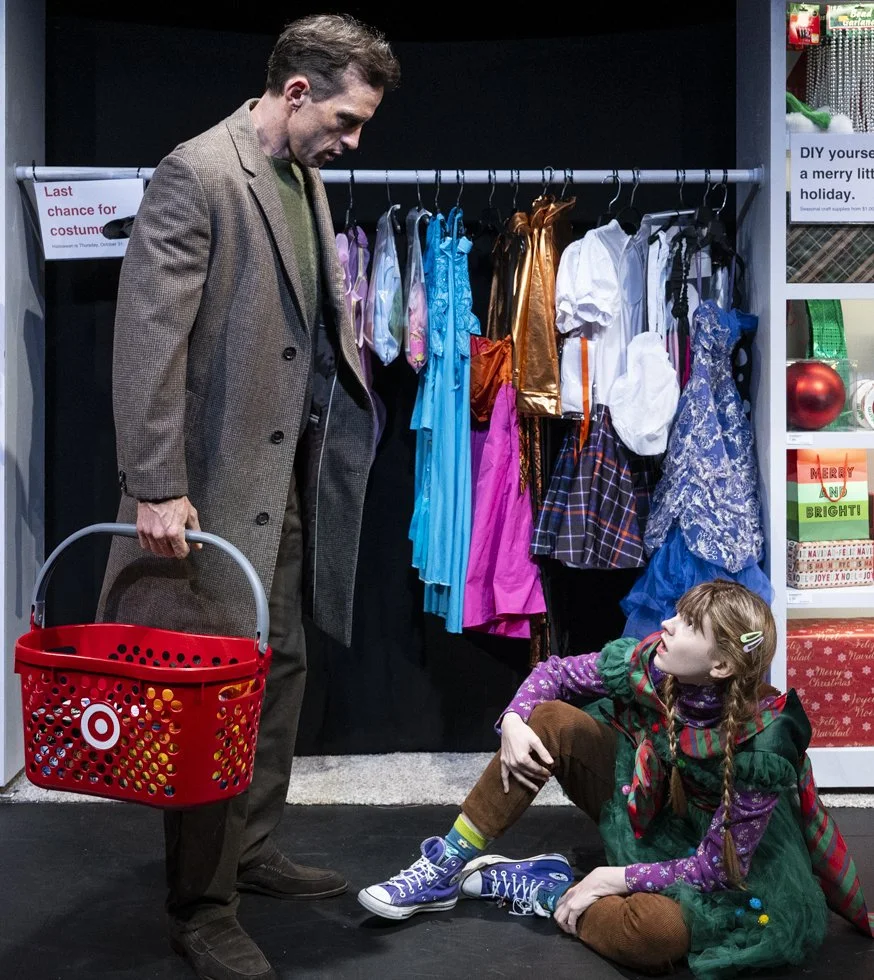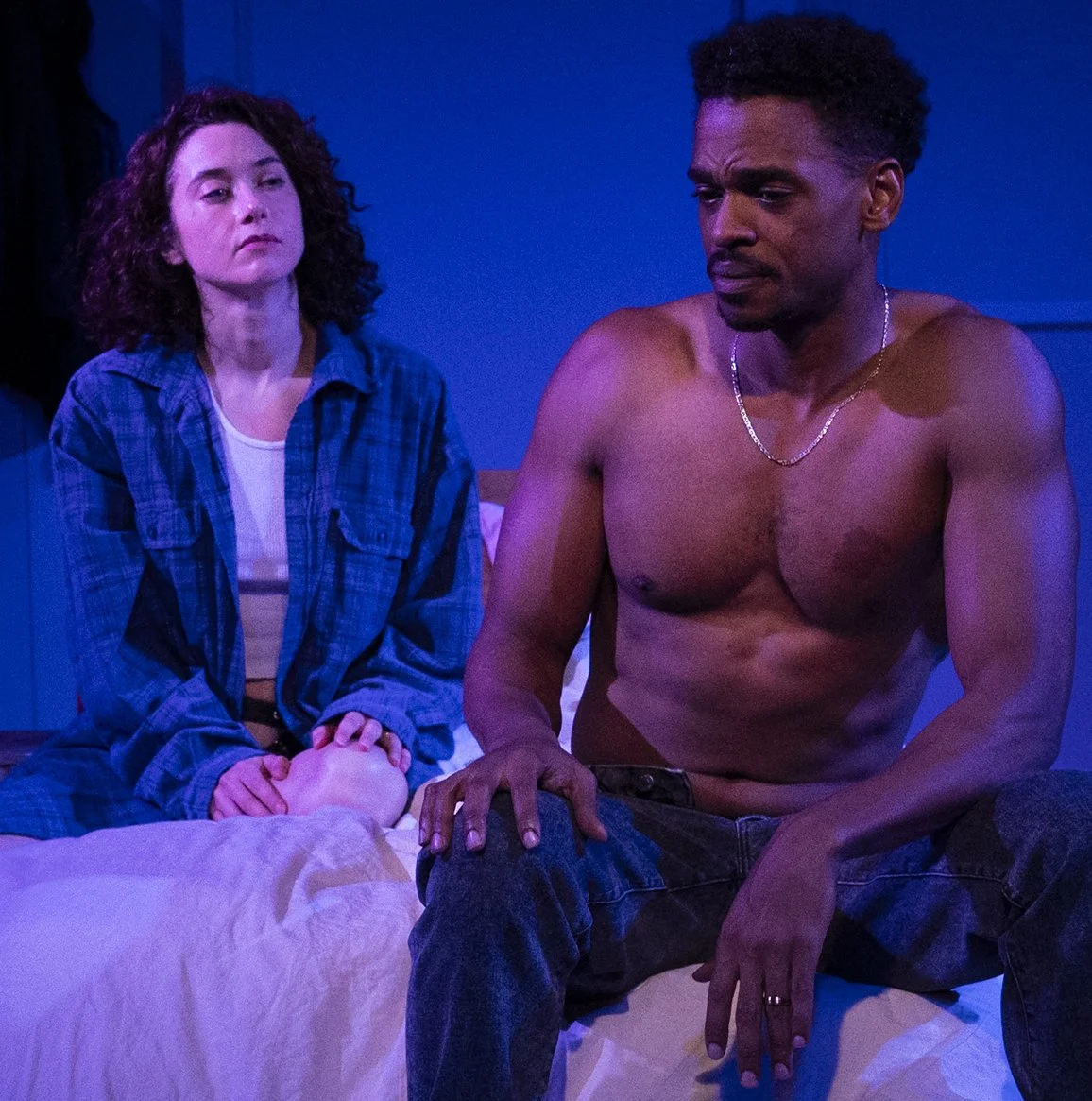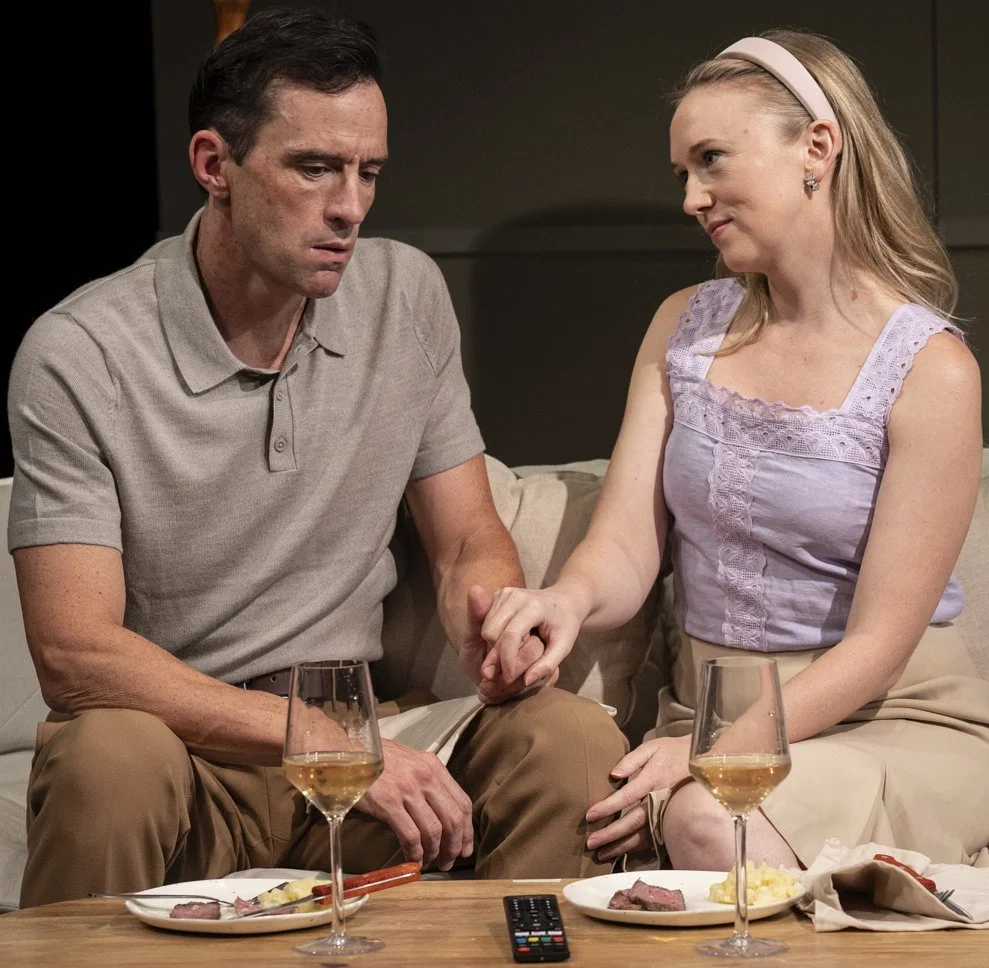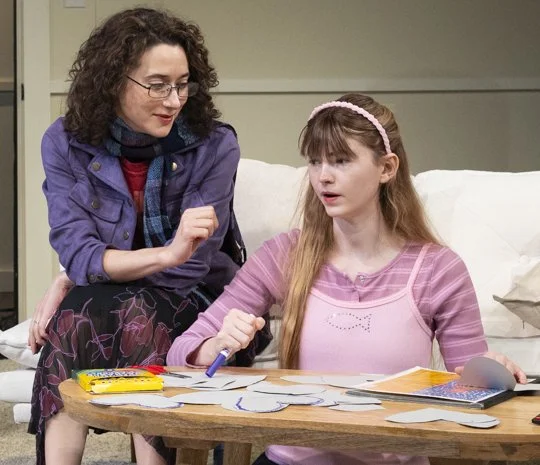Nathan Darrow portrays Hank and Georgia Waehler is Mia in a scene at Target from Ali Keller’s (un)conditional, a play that reminds one that the strongest love is not rooted in rigid roles.
Ali Keller’s (un)conditional, directed by Ivey Lowe, takes an unflinching look at two heterosexual marriages tested by sexual desires, shifting boundaries, and the uneasy bargains couples make in the name of love. With sharp writing and intimate staging, the play probes what one is willing to give—or give up—in relationships meant to last a lifetime.
Kate Abbruzzese as Valerie and Brooks Brantly as her husband, Kyle, grapple with desire and disappointment.
The drama unfolds through two marriages—those of Valerie (Kate Abbruzzese) and Kyle (Brooks Brantly), and Lenox (Annalisa Chamberlin) and Hank (Nathan Darrow)—each shaped by unspoken frustrations and diverging needs.
Valerie and Kyle, high school sweethearts now celebrating their tenth wedding anniversary, share a precocious 7-year-old daughter, Mia (Georgia Waehler). Hoping to reignite passion in their relationship, Valerie introduces a purple strap-on dildo in the bedroom, proposing a role reversal in their sex life. Kyle flatly refuses the idea, and when Valerie presses him to reconsider, his rejection drives her to storm off to her parents’ home. Or as she vehemently insists:
Valerie: Maybe I should stay with my parents. . . just until we find a way to feel safe around each other again.
Meanwhile, Lenox and Hank’s marriage is strained by a different impasse. Once tutor and student, they fell in love and built a life together, but Hank’s chronic impotence has left Lenox’s yearning to start a family unfulfilled. Hank insists that their love should be enough and resists the prospect of parenthood, while Lenox grows increasingly desperate in her attempts to reignite their sexual intimacy.
Hank and his wife, Lenox (Annalisa Chamberlin) discuss starting a family in a tense moment.
Adding another layer of complexity, Lenox not only serves as the household’s primary breadwinner but also happens to be Kyle’s boss, a dynamic that draws the two couples—and 7-year-old Mia—into closer orbit. This connection surfaces in a pivotal scene set a few days before Halloween, when Hank and Lenox are shopping at Target. As they browse the aisles, Lenox reminds Hank that this will be their first holiday in their new house since her job promotion and insists they should make an effort to meet the neighbors and have candy ready for the neighborhood children. Or, as Lenox points out to Hank:
Lenox: Come on. It’s our first house holiday. Don’t you want to meet our neighbors and their kids?
Hank: It’s not like we’re gonna be baby-sitting.
Lenox: We don’t want to be the town Boo Radleys.
Playwright Keller clearly demonstrates her superb skill in plot-building with this scene. It begins lightly, as Kyle and Mia call playfully to each other from different aisles of the store, then escalates when Mia—dressed in a poofy Christmas gown with the tags still attached—comes barreling around the corner and collides with Hank under Lenox’s watchful eye. Kyle quickly scoops up his daughter, and when he recognizes Lenox, his apology shifts awkwardly into a greeting for his boss:
Kyle: Sorry about that, we—hey, hi—I’m just glad at least Mia slammed into someone we know.
Kate (Abbruzzese, left), and Mia spend some time together at home. Photographs by Russ Rowland.
The tension rises further when Lenox informs Kyle that a scheduled Zoom meeting has been moved up to that afternoon, forcing him to cut the shopping trip short. Mia, devastated at losing her promised soft pretzel from the snack bar, throws a tantrum and squirts face paint across the floor in protest. Despite his earlier insistence that he isn’t good with children, Hank is the one who manages to defuse the situation. With quick thinking, he picks up a magician’s wand from the Halloween aisle and playfully sketches a pretzel out of the spilled paint. The trick may not have pleased the store’s cleaning crew, but it delights Mia and restores calm. On the way home, Lenox seizes the moment, gently reminding her husband of the larger stakes:
Lenox: No, Hank, you were so good with Mia. You should be a father. Don’t give up yet. Please.
What ultimately gives (un)conditional its resonance is the strong ensemble work of the quintet, who navigate Keller’s switchback turns with agility and conviction. Each actor brings nuance to the play’s most sensitive sexual material, never sensationalizing it but instead humanizing it, rooting each scene in the vulnerabilities, contradictions, and longings that shape intimate relationships. Their performances ensure that Keller’s exploration of love and desire feels as authentic as it is dramatically compelling.
In the end, (un)conditional underscores that love endures most powerfully when it is unconditional, even as couples wrestle with desire and disappointment. As the 2024 Lighthouse Series selection at SoHo Playhouse, it also confirms Ali Keller as a playwright worth watching—fearless in her candor and alive to the complexities of intimacy.
Ali Keller’s (un)conditional plays through Oct. 26 at SoHo Playhouse (15 Vandam St.). Evening performances are at 7 p.m. Monday, Wednesday, Thursday, Friday, Saturday and 5 p.m. Sunday. For tickets and more information, visit sohoplayhouse.com.
Playwright: Ali Keller
Director: Ivey Lowe
Scenic Design: Lindsay Fuori
Lighting Design: Kat Morrill
Costume Design: Olivia Vaughn Hern
Sound Design & Music: Elliot Yokum






